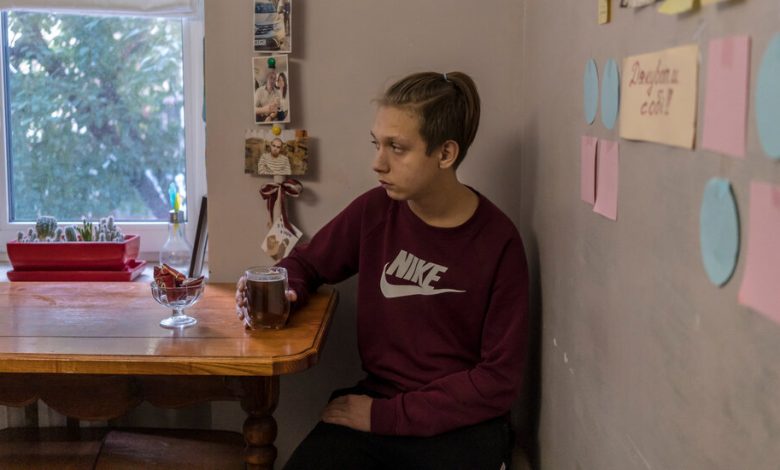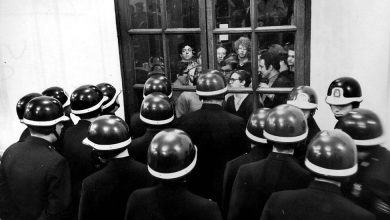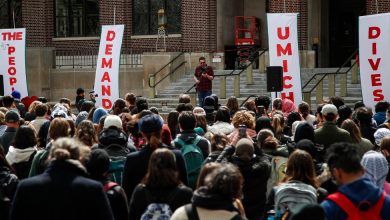Ukraine’s Children With Special Needs Suffer the ‘Huge Pressure’ of War

Maksym, 13, needs a life of stability and routines, but almost two years of war in Ukraine have given him anything but that.
The boy, his adult brother and his mother fled their home city, Mariupol, under Russian attack. His father was captured as a prisoner of war. And Maksym has had to live with the sounds of bomb explosions and air raid sirens in Kyiv, where he now lives. The therapist who once treated him in Mariupol has also become a refugee.
Maksym, who has attention deficit and hyperactivity disorder, or ADHD, has struggled to cope and has been having anxiety attacks, said his mother, Maryna Honcharova. He finds it hard to study, often becomes aggressive, and doesn’t want to wake up in the morning, she said.
“He screams and throws things in the house,” she said. It often happens when he wants to do something like ride the bicycle he left behind in Mariupol.
“He remembers that and starts screaming in anger that the Russians took everything from him,” his mother said. The list includes his father, whom the family has not heard from since he was taken prisoner by Russian forces well over a year ago.
Millions of families across Ukraine have had their lives upended by the war, shattering the rhythms of daily routines. And for many children with ADHD, autism and other special education needs, the trauma of the war has often undermined them in unique ways, causing regressions in their development, their families and experts say.
“All children had at least some decline in how they feel or study and children with special educational needs in particular,” said Dmytro Vakulenko, a psychologist and co-founder of a charity foundation, Mental Help 365.
The children with special needs, he said, “need stability, but the war ruins it, even if you are far away from the front line.”
Almost half a million children have requested the help of school psychologists on the specific issue of learning difficulties exacerbated by the war, according to Ukraine’s Ministry of Education.
Overall, the number of children getting psychological support in schools has doubled since Russia’s full-scale invasion of Ukraine in February last year. Five million students saw school psychologists for help in 2022, compared to 2.5 million the year before, the ministry said.
Schools are also operating under heavy constraints. By law, only schools with bomb shelters can have full on-site lessons, meaning that many students have to study online, or part-time in the classroom. Maksym can study in class only every other week, because his school’s bomb shelter can’t fit all the children.
Mental Help 365, which provides therapeutic help for free, says that 90 percent of the referrals it gets are for children with special needs.
But the country currently has a severe shortage of therapists and psychologists, partly because so many of them, like millions of other Ukrainians, have left the country as refugees, experts say.
“The war puts a huge pressure on children with special educational needs,” said a deputy education minister, Yevheniya Smirnova. “There are studies showing that even the sounds of the sirens influence children,” she said, adding, “With all this we have an extreme shortage of specialists.”
Each school psychologist now serves about 600 children and their parents, Ms. Smirnova said.
Mental Help 365 received funding from UNICEF, the United Nations’ children’s fund, and gathered a team of specialists to provide psychological support to 1,657 children with special needs across the country. The foundation says much more help is needed.
Waiting times for treatment in qualified private development centers can stretch to half a year or longer. Sessions are also expensive, and often out of reach of people who have been forced to flee their homes.
This means that many families have to go to charities for help.
That undercuts the socialization that experts say is important for children with neurodevelopmental disorders like ADHD. Being among other children helps develop communication skills, including learning how to speak and interact with others, they say.
Arina, a 12-year-old from Zaporizhzhia who has Asperger’s syndrome and speech and language delay, can’t go to her school since it doesn’t have a bomb shelter. “Online education for children like my daughter doesn’t work at all,” said her mother, Victoria Porseva, 41.
The family also can’t get their daughter into a private school because of overcrowding among them. “She gets sad that children do not want to be friends with her as they do not understand her,” Ms. Porseva said. “Socialization is very important, but school is closed.”
Roman, a 13-year-old boy with autism, also only has online lessons. He, too, doesn’t want to study, said his mother, Olena Deina. She added that he developed sleeping problems after the first aerial bombings of the eastern Kharkiv region, where the family lives now, his mother said.
“He is a smart boy and studied just like all other kids before the war and now he has no motivation at all, just tells me, ‘Mom, I don’t want to,’” she said.
Maksym first exhibited signs of aggression after he and his family were evacuated from Mariupol, his mother said.
“We had to pass through 20 Russian check points,” she said. “Maksym was very quiet all the way and only once we settled in and calmed down, after a few days he took out on me all he had been holding inside.”
At first, Ms. Honcharova said she yelled back at her son. But then she understood that “it makes everything only worse,” she said, causing him to scream back “horrible words.”
Back home in Mariupol, it was easier to help Maksym together with her husband. “When he heard me losing control, he would come in and take over, and I did the same,” Ms. Honcharova said.
Maksym and his mother together live in a one-bedroom home, where a Christmas tree from last year still stands, unopened presents still beneath it. The presents were for Maksym’s father, in the hopes that he would be home last Christmas.
Ms. Honcharova says she can’t find the strength to take the tree down or remove the gifts.
Maksym has a desk in his room, near a window, where he studies or attends online class. Above his desk hangs a piece of paper which says, “I pray for you every day, Dad.”
Back in Mariupol, the family had a therapist for Maksym who helped him greatly, his mother said. He could read and write and made some friends, giving the family hope for his development. “We thought we finally managed to overcome this challenge,” she said, but added: “Now we have lost all our achievements.”
Mental Health 365 provided Maksym with 15 free sessions, but the family can’t afford the cost of paying for a regular therapist.
Before leaving Mariupol, Ms. Honcharova said, Maksym had been able to get ready and go to school on his own. “But now,” she said, “I can’t even wake him up.”



